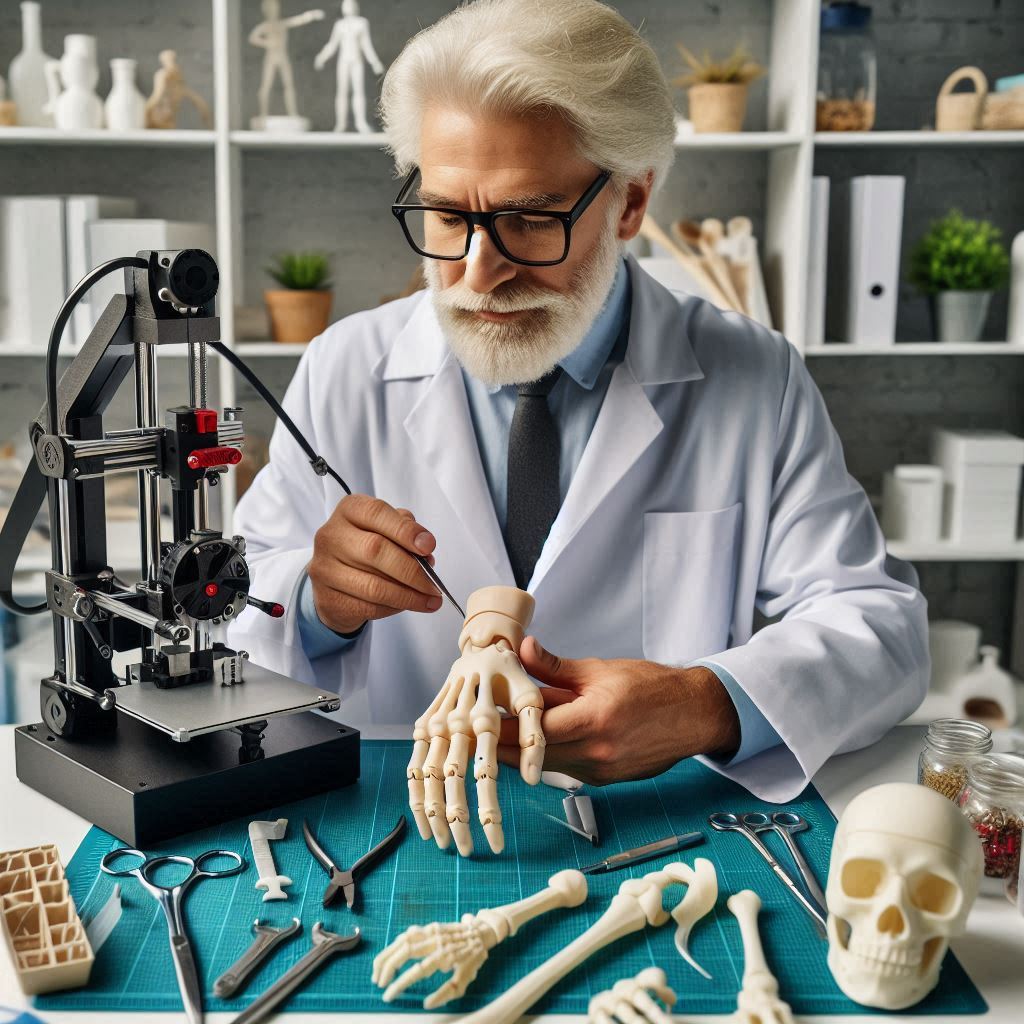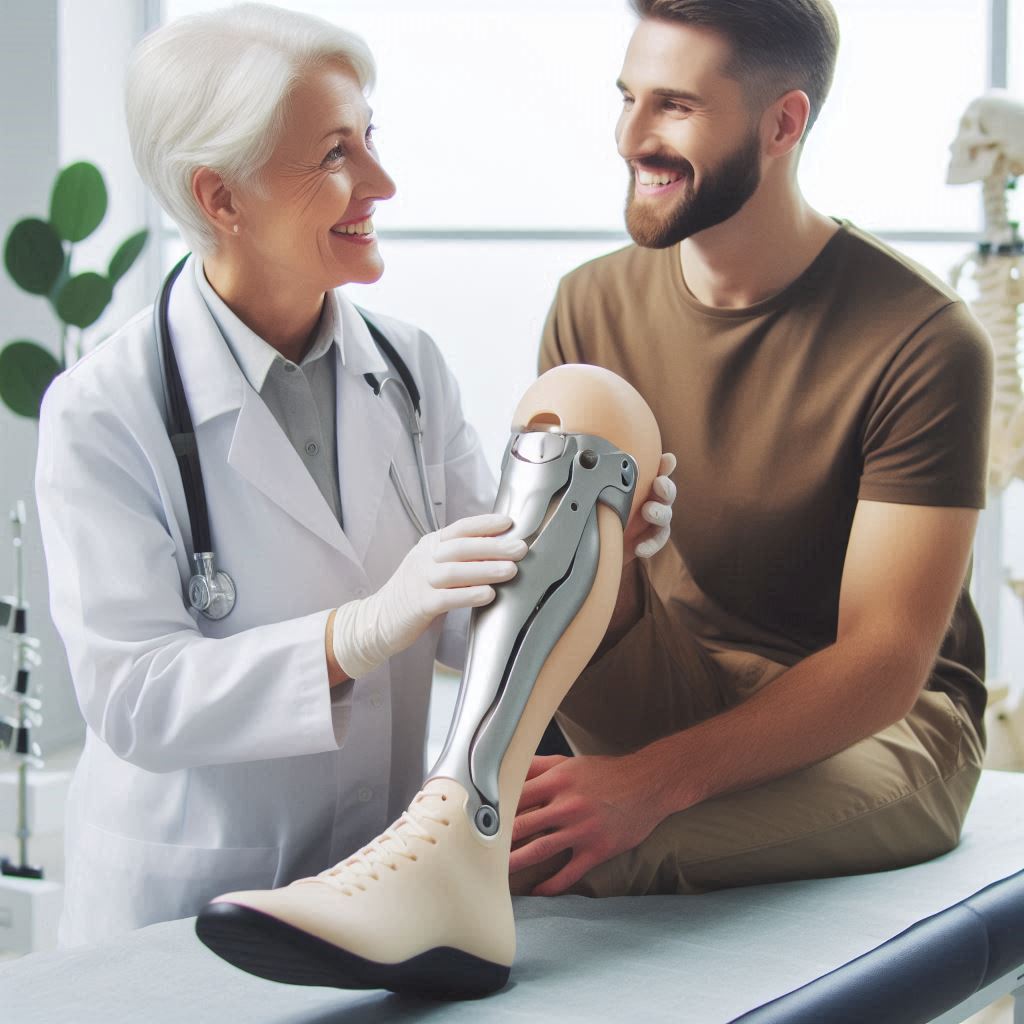Introduction
Orthopedic technologists play vital roles in healthcare, assisting orthopedic surgeons with surgeries, patient care, and equipment management.
Their expertise ensures successful orthopedic procedures and patient recovery.
However, the field of orthopedics is ever-evolving, and staying updated with the latest advancements and techniques is crucial.
This is where continuing education comes into play.
Brief Overview of What an Orthopedic Technologist Does
Orthopedic technologists are responsible for preparing and maintaining surgical instruments, ensuring sterile environments, and assisting during surgeries.
They work closely with orthopedic surgeons, providing critical support in procedures involving bones, joints, and muscles.
Their duties also include applying casts, braces, and splints, and educating patients about post-operative care and rehabilitation.
Technologists need a strong understanding of anatomy, physiology, and orthopedic procedures to excel in their roles.
Importance of Continuing Education for Orthopedic Technologists
Continuing education is essential for orthopedic technologists to maintain and enhance their skills and knowledge.
The healthcare field, especially orthopedics, constantly evolves with new technologies, techniques, and best practices.
By engaging in continuing education, technologists stay abreast of these changes, ensuring they provide the highest quality care to patients.
Additionally, continuing education helps technologists meet certification and licensing requirements, enhancing their professional credibility and career prospects.
It fosters a culture of lifelong learning, promoting excellence and innovation in orthopedic care.
Preview of Different Continuing Education Paths for Orthopedic Technologists
There are various continuing education paths available for orthopedic technologists, catering to different learning preferences and career goals.
One option is attending workshops and seminars that focus on specific orthopedic techniques, new technologies, and patient care strategies.
These events provide hands-on training and opportunities to interact with experts in the field.
Benefits of Continuing Education for Orthopedic Technologists
Advantages of Staying Current in Orthopedic Technology
As an orthopedic technologist, staying informed about the latest advancements in orthopedic technology is crucial.
By participating in continuing education, you can ensure that you are up-to-date on the most recent techniques, tools, and procedures in the field.
This knowledge allows you to provide the best possible care to your patients and contribute to the overall improvement of orthopedic practices.
Enhancing Skills and Knowledge
Continuing education provides orthopedic technologists with the opportunity to enhance their skills and expand their knowledge base.
By taking courses, attending workshops, and pursuing certifications, you can learn new techniques, refine existing skills, and stay abreast of industry trends.
This ongoing development not only benefits you as a professional but also benefits the patients you serve.
Expanding Job Opportunities
By engaging in continuing education, orthopedic technologists can increase their job opportunities.
Employers value professionals who demonstrate a commitment to learning and growth, making you a more attractive candidate for promotions and new positions.
Additionally, earning advanced certifications or specialized training can open doors to higher-paying roles within the field.
Boosting Earning Potential
Continuing education can also lead to an increase in earning potential for orthopedic technologists.
With advanced certifications and specialized training, you may qualify for higher-paying positions or negotiate better salaries.
By investing in your professional development, you are not only enhancing your skills and knowledge but also positioning yourself for greater financial reward in the long run.
Read: Ultrasound Technician vs. Radiologic Technologist
Different Paths for Continuing Education
Pursuing a Specialized Certification in Orthopedic Technology
One of the most common paths for continuing education as an orthopedic technologist is to pursue a specialized certification.
This certification demonstrates a commitment to advancing your knowledge and skills in the field.
There are various organizations that offer certifications in orthopedic technology, such as the National Board for Certification of Orthopaedic Technologists (NBCOT) or the American Society of Orthopedic Professionals (ASOP).
These certifications often require a combination of education, experience, and passing an exam.
By obtaining a specialized certification, orthopedic technologists can enhance their credibility and marketability in the industry.
Completing Advanced Degree Programs in Orthopedic Technology or Related Field
Another option for continuing education is to pursue advanced degree programs in orthopedic technology or a related field.
This could include a Master’s degree in Orthopedics or a healthcare-related field.
These programs provide a more in-depth understanding of orthopedic technology and may open up opportunities for leadership roles or specialized areas of practice.
They can also enhance critical thinking and research skills.
Some universities offer online or part-time programs to accommodate working professionals.
By completing an advanced degree, orthopedic technologists can position themselves for career advancement and higher earning potential.
Attending Workshops, Seminars, and Conferences Related to Orthopedic Technology
Attending workshops, seminars, and conferences is a valuable way to stay current with the latest trends and advancements in orthopedic technology.
These events often feature expert speakers and hands-on learning experiences.
By participating in these opportunities, orthopedic technologists can expand their knowledge base, network with industry professionals, and gain insights into best practices.
This can lead to improved patient care and job satisfaction.
Many professional organizations, such as the Orthopedic Trauma Association or the National Association of Orthopaedic Technologists, host annual conferences and offer continuing education opportunities for members.
Participating in Online Courses and Webinars
Online courses and webinars provide a convenient and flexible way for orthopedic technologists to continue their education.
These platforms offer a wide range of topics and allow individuals to learn at their own pace.
Whether it’s brushing up on specific techniques or exploring new treatment modalities, online courses can help orthopedic technologists enhance their skills and knowledge.
Some courses even offer continuing education credits for certification renewal.
Platforms like Coursera, Udemy, or MedBridge provide access to a wealth of educational resources tailored to orthopedic professionals.
By engaging in online learning, orthopedic technologists can stay competitive in the field.
Read: Benefits of a Career as an Ultrasound Technician
Importance of Networking in Continuing Education
Networking plays a crucial role in the continuing education of orthopedic technologists.
Building connections with other professionals, learning from experienced colleagues, and exploring job opportunities can significantly enhance career development.
Building Connections with Other Professionals in the Field
Networking allows orthopedic technologists to build valuable connections with other professionals in the field.
Attending conferences, workshops, and seminars provides opportunities to meet peers and industry leaders.
These connections foster a sense of community and open doors to collaboration and mentorship.
Through networking, technologists can share insights, discuss challenges, and exchange knowledge about the latest advancements in orthopedic care.
This collaborative environment helps technologists stay informed and continuously improve their skills.
Learning from Experienced Orthopedic Technologists
Experienced orthopedic technologists offer a wealth of knowledge and expertise that can be invaluable to those newer to the field.
Networking facilitates the transfer of this knowledge through formal and informal mentoring relationships.
Experienced technologists can provide guidance on complex procedures, share best practices, and offer tips on navigating the challenges of the profession.
Learning from their experiences helps less experienced technologists avoid common pitfalls and adopt proven techniques, enhancing their proficiency and confidence in their roles.
Exploring Job Opportunities and Career Advancement through Networking
Networking is a powerful tool for exploring job opportunities and advancing one’s career.
Connections made through professional associations, conferences, and online platforms can lead to job referrals and recommendations.
Many job openings are filled through word-of-mouth and personal referrals, making a strong professional network invaluable.
Networking also exposes technologists to various career paths within orthopedics, such as specialized roles, research positions, or leadership opportunities.
By engaging with a broad network of professionals, technologists can gain insights into different career trajectories and make informed decisions about their professional development.
Read: Understanding Ultrasound Technician Certifications

Funding Options for Continuing Education
When it comes to advancing your career as an orthopedic technologist, continuing education is key.
Investing in further education can open up new opportunities, increase your earning potential, and enhance your skills in this specialized field.
However, one of the common challenges individuals face is finding the right funding options for their continuing education.
Here are some options to consider:
Transform Your Career Today
Unlock a personalized career strategy that drives real results. Get tailored advice and a roadmap designed just for you.
Start NowEmployer-sponsored training programs
Many healthcare facilities and orthopedic clinics offer employer-sponsored training programs for their employees.
These programs may cover the cost of tuition, fees, and study materials for courses related to orthopedic technology.
By participating in these programs, you can enhance your skills while also showing your commitment to professional development to your employer.
Scholarships and grants for orthopedic technologists
There are various scholarships and grants available specifically for orthopedic technologists looking to further their education.
Organizations such as the National Association of Orthopaedic Technologists (NAOT) and the American Society of Orthopaedic Technologists (ASOT) offer scholarships to help cover the cost of tuition and other expenses associated with continuing education.
These opportunities can help alleviate the financial burden of pursuing advanced training programs.
Student loans and financial aid for advanced degree programs
If you are considering pursuing an advanced degree program in orthopedic technology, you may be eligible for student loans and financial aid.
The Free Application for Federal Student Aid (FAFSA) is a great starting point to determine your eligibility for federal grants, loans, and work-study programs.
Additionally, many private lenders offer student loans specifically for healthcare professionals, including orthopedic technologists.
Overall, funding options for continuing education as an orthopedic technologist are varied and cater to different financial situations and career goals.
By exploring these options and creating a financial plan, you can take the next step in your professional development and excel in your field.
Read: Preparing for a Sonography Job Interview: Tips
Challenges and Solutions in Continuing Education
Continuing education presents several challenges for orthopedic technologists. Balancing work, family, and education commitments requires effective strategies and resources to succeed.
Balancing Work, Family, and Education Commitments
Orthopedic technologists often struggle to balance their professional responsibilities with family obligations and continuing education.
Long work hours and demanding family schedules can leave little time for studying and attending classes.
To overcome this challenge, technologists must prioritize tasks and set realistic goals.
Communicating with family members about the importance of continuing education can also help gain their support and understanding.
Creating a dedicated study space at home can minimize distractions and foster a conducive learning environment.
Time Management Tips for Busy Orthopedic Technologists
Effective time management is crucial for orthopedic technologists pursuing continuing education.
One helpful tip is to create a weekly schedule that includes specific study times.
Breaking study sessions into smaller, manageable chunks can prevent burnout and improve retention.
Technologists should also utilize downtime at work, such as during lunch breaks, to review notes or read relevant articles.
Setting clear, achievable goals for each study session can enhance focus and productivity.
Additionally, using a planner or digital calendar to track assignments and deadlines can prevent last-minute cramming and reduce stress.
Utilizing Online Resources and Study Tools for Self-Paced Learning
Online resources and study tools offer flexible solutions for orthopedic technologists.
These resources allow technologists to learn at their own pace, fitting education into their busy schedules.
Many reputable organizations offer online courses and webinars covering various orthopedic topics.
Technologists can access these resources anytime, enabling them to study during non-traditional hours.
Interactive study tools, such as quizzes and flashcards, can reinforce learning and make studying more engaging.
Online forums and discussion groups also provide opportunities for technologists to connect with peers and seek advice.
You Might Also Like: Becoming a Perfusionist: Education and Training Requirements
See Related Content: Importance of Accuracy in Medical Coding
Professional Development and Growth Opportunities
Orthopedic technologists have various paths for continuing education and professional growth.
These opportunities not only enhance their skills and knowledge but also open doors to new career prospects and advancement in the field.
Advancing to Leadership Roles in Orthopedic Technology
One of the primary goals for orthopedic technologists is to advance to leadership roles within their field.
By pursuing advanced degrees or certifications in leadership and management, they can qualify for positions such as orthopedic department manager or director.
Leadership roles in orthopedic technology involve overseeing teams of technologists, coordinating patient care, managing budgets, and implementing best practices.
This career path allows technologists to take on more responsibilities and contribute to the overall success of the orthopedic department.
Orthopedic technologists who aspire to leadership roles can benefit from mentorship programs, professional networking opportunities, and participation in conferences and workshops focused on management and leadership skills.
Specializing in a Specific Area of Orthopedics
Another avenue for professional development is to specialize in a particular area of orthopedics.
By focusing on a specific subspecialty such as sports medicine, pediatric orthopedics, or trauma surgery, technologists can deepen their expertise and become valuable assets in their respective fields.
Specializing in a specific area of orthopedics requires additional training and certification.
Technologists may pursue postgraduate education, attend specialized courses or workshops, and seek mentorship from experts in their chosen subspecialty.
By becoming specialists in a particular area of orthopedics, technologists can provide specialized care to patients, collaborate with other healthcare professionals in multidisciplinary teams, and stay up-to-date on the latest advancements and treatment modalities in their subspecialty.
Contributing to Research and Innovation in Orthopedic Technology
Orthopedic technologists can also participate in research and innovation to advance the field of orthopedic technology.
By conducting studies, developing new techniques or technologies, and collaborating with researchers and clinicians, technologists can contribute to the advancement of orthopedic care.
Involvement in research and innovation requires technologists to stay current on the latest trends and developments in orthopedics.
They may collaborate with academic institutions, hospitals, or industry partners to work on research projects, clinical trials, or product development initiatives.
By contributing to research and innovation, orthopedic technologists can improve patient outcomes, enhance the quality of care, and establish themselves as thought leaders in their field.
This path of professional development allows technologists to make a lasting impact on the field of orthopedics.
Conclusion
Continuing education is crucial for orthopedic technologists.
It keeps skills sharp and knowledge updated.
Staying current enhances patient care quality.
It opens doors to advanced career opportunities.
Orthopedic technology evolves rapidly with new techniques.
Continuous learning ensures technologists adapt effectively.
Exploring various paths like specialized certifications enriches expertise.
It broadens scope and boosts professional confidence.
Networking through workshops and conferences fosters collaboration.
Engaging in ongoing education demonstrates commitment.
Employers value technologists dedicated to continuous improvement.
The dynamic nature of orthopedic technology demands adaptability.
Technologists thrive by embracing lifelong learning.
Keeping abreast of industry advancements ensures relevance.
It prepares technologists for future challenges and innovations.
Investing in education is investing in career longevity.
The benefits extend beyond personal growth.
Orthopedic technologists play pivotal roles in patient care.
They contribute significantly to healthcare outcomes.
Advancing skills through education enhances job satisfaction.
It promotes a sense of professional fulfillment.
Embrace the journey of lifelong learning eagerly.
Explore diverse educational opportunities available.
Each path leads to enhanced knowledge and expertise.
Seize opportunities to specialize and excel.
Uphold the standard of excellence in patient care.
Emphasize the importance of continuous self-improvement.
Stay curious and proactive in professional development.
Your dedication shapes the future of orthopedic technology.
Keep learning, growing, and achieving new heights.
Take pride in contributing to healthcare excellence daily.
Your commitment to learning inspires others in the field.
Together, we advance orthopedic care standards.
Celebrate achievements and milestones in your journey.
Remember, education is the cornerstone of progress.
As you forge ahead, remember your impact matters.
Stay resilient, adaptable, and passionate always.
The future of orthopedic technology awaits your expertise.
Start your next learning journey today!
[E-Books for Sale]
The Big Book of 500 High-Paying Jobs in America: Unlock Your Earning Potential
$19.99 • 500 High-Paying Jobs • 330 pages
Explore 500 high-paying jobs in America and learn how to boost your career, earn more, and achieve success!
See All 500 High-Paying Jobs of this E-Book
1001 Professions Without a Degree: High-Paying American Jobs You Can Start Now
$19.99 • 1001 Professions Without a Degree • 174 pages
Discover 1001 high-paying jobs without a degree! Unlock career tips, skills, and success strategies for just $19.99!




